古希腊英文简介
- 格式:doc
- 大小:31.00 KB
- 文档页数:3
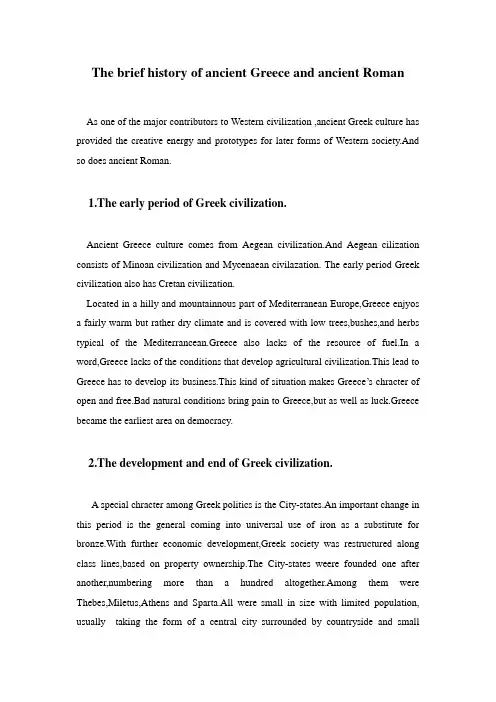
The brief history of ancient Greece and ancient RomanAs one of the major contributors to Western civilization ,ancient Greek culture has provided the creative energy and prototypes for later forms of Western society.And so does ancient Roman.1.The early period of Greek civilization.Ancient Greece culture comes from Aegean civilization.And Aegean cilization consists of Minoan civilization and Mycenaean civilazation. The early period Greek civilization also has Cretan civilization.Located in a hilly and mountainnous part of Mediterranean Europe,Greece enjyos a fairly warm but rather dry climate and is covered with low trees,bushes,and herbs typical of the Mediterrancean.Greece also lacks of the resource of fuel.In a word,Greece lacks of the conditions that develop agricultural civilization.This lead to Greece has to develop its business.This kind of situation makes Greece’s chracter of open and free.Bad natural conditions bring pain to Greece,but as well as luck.Greece became the earliest area on democracy.2.The development and end of Greek civilization.A special chracter among Greek politics is the City-states.An important change in this period is the general coming into universal use of iron as a substitute for bronze.With further economic development,Greek society was restructured along class lines,based on property ownership.The City-states weere founded one after another,numbering more than a hundred altogether.Among them were Thebes,Miletus,Athens and Sparta.All were small in size with limited population, usually taking the form of a central city surrounded by countryside and smalltowns.They were ruled either by Inoians or Dorians,with Athens and Sparta as the most develped and powerful.The newly founded polis was ususally ruled by either the slave-owning aristocrat or the military leader turned king.But some tates could be ruled by the archons such as Draco and Solon,who would proceed with their reforms.With the City-statas developing,old law can’t meet majority any more.So Greek politicians,for example,Draco,cleisthenes and Peisisitratus,begain to improve Greek polis.Their politics develop Greek democracy and make Greek people have more power.Greek civilization came to its peak during Pericles’reign and then beganto decling.Under the leadership of Pericles during 499-449 BC,the coalition force of the Greek city-states defeated the Perisian troops in the two wars against Perisian invaders.Howeve,peace and stability did not last long after the victory because a split occurred between the two strongest city-states leading to the decline of Athens and most poleis involved in the war which spead all over the Peninsula of Peloponnesus.The wars not only brought great losses to Athens,but also dooomed all the Greek poleis to irretrievable setback and decline,and opened the way for the invasion of later aggresors like Macedonia, Gaul and Rome.The regions of Greek peninsula and Agean Sea islands were all seized and conquered by welltraned Roman troops before 146 BC and merged into the map of Roman Empire.3.The beginning of RomeThe Italian city of Rome is the birthplace of Roman Empire and,therefore,the origin of Roman culture.Geographically located in the south of the European continent and surrouned on three sides by the seas,Italy occupies the Apennines Peninsula,one of the three major land masses of the northern MediterraneanEarly Rome originated from some small villages in central Italy,not fr away from the seashore.It is said that early Rome was ruled by seven kings.Afterwards,the citywas ruled by two consus and a senate.The historical process began about 509 BC or so and lasted until over 500 years later when the Emperor Octavian founded his dictatorship in place of the republic.4.The devolopment of RomeDuring the 4th century BC, Rome unified Italy by military conquest. There are many wars in Roman history.A large number of slaves were brought to Rome because of victories duing the frequent wars.These slavesdo a lot for Roman development.In 83 BC,the Roman military commander L.Sulia Felix,led his troops in putting down his opponents and established his dictatorship.By conquering Gaul,Caesar’s military power,financial income and his own prestige were all greatly enhanced,thus achieving outstanding merit in both civil and mili tary affairs.After Caesar died,it led to the birth of the second Triumvirate.IN the two centuries after Augustus took power,the Roman Empire reached its culmination.Beginning from the 5th century or so,the Roman Empire embarked on a path of decline.Civil wars repeatedly broke out and brought instability and disasters to the ordinary people.Economic development and social prosperity were checked.Long before that,the Roman Empire had actually broken up into two parts.。
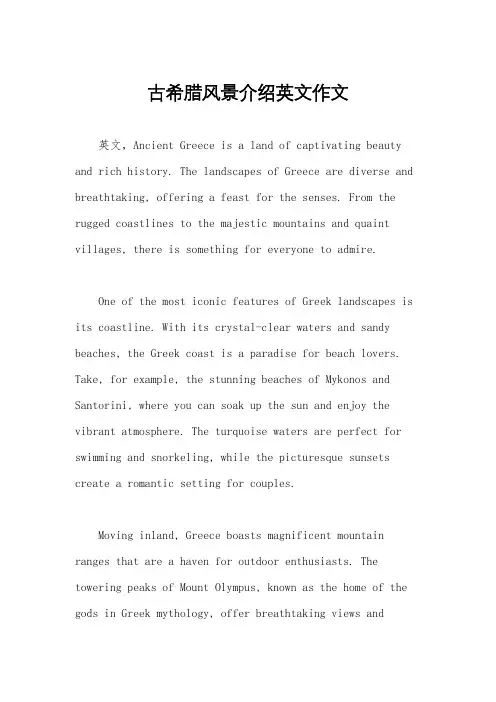
古希腊风景介绍英文作文英文,Ancient Greece is a land of captivating beauty and rich history. The landscapes of Greece are diverse and breathtaking, offering a feast for the senses. From the rugged coastlines to the majestic mountains and quaint villages, there is something for everyone to admire.One of the most iconic features of Greek landscapes is its coastline. With its crystal-clear waters and sandy beaches, the Greek coast is a paradise for beach lovers. Take, for example, the stunning beaches of Mykonos and Santorini, where you can soak up the sun and enjoy the vibrant atmosphere. The turquoise waters are perfect for swimming and snorkeling, while the picturesque sunsets create a romantic setting for couples.Moving inland, Greece boasts magnificent mountain ranges that are a haven for outdoor enthusiasts. The towering peaks of Mount Olympus, known as the home of the gods in Greek mythology, offer breathtaking views andchallenging hiking trails. Exploring the mountain villages nestled among the hills provides a glimpse into traditional Greek life, where locals welcome visitors with warm hospitality and delicious cuisine.In addition to its natural beauty, Greece is also hometo a wealth of historical sites that showcase its rich cultural heritage. The ancient ruins of Athens, including the Acropolis and Parthenon, stand as a testament toGreece's illustrious past. Walking through these ancient sites, you can't help but feel awestruck by thearchitectural wonders and the stories they tell of a bygone era.中文,古希腊是一个充满迷人美景和丰富历史的国度。
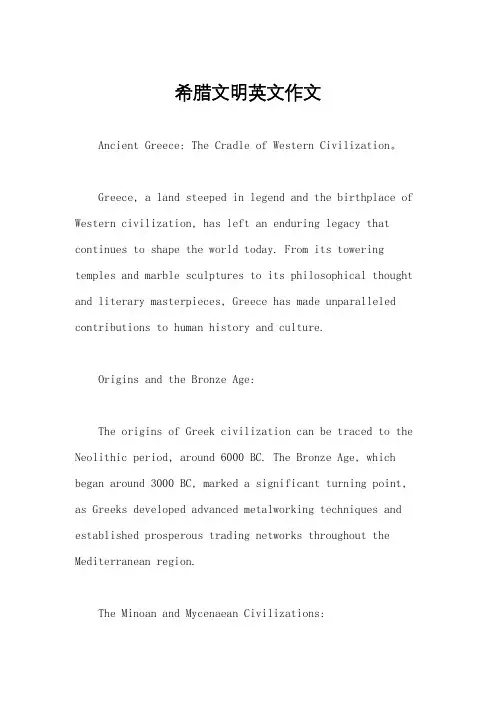
希腊文明英文作文Ancient Greece: The Cradle of Western Civilization。
Greece, a land steeped in legend and the birthplace of Western civilization, has left an enduring legacy that continues to shape the world today. From its towering temples and marble sculptures to its philosophical thought and literary masterpieces, Greece has made unparalleled contributions to human history and culture.Origins and the Bronze Age:The origins of Greek civilization can be traced to the Neolithic period, around 6000 BC. The Bronze Age, which began around 3000 BC, marked a significant turning point, as Greeks developed advanced metalworking techniques and established prosperous trading networks throughout the Mediterranean region.The Minoan and Mycenaean Civilizations:Two major civilizations flourished in Greece during the Bronze Age: The Minoans on the island of Crete and the Mycenaeans on the mainland. The Minoans were renowned for their advanced maritime skills, elaborate palaces, and exquisite pottery. The Mycenaeans, meanwhile, developed a powerful warrior culture and controlled much of mainland Greece.The Dark Ages and the Rise of City-States:The Bronze Age collapse around 1200 BC ushered in a period known as the Dark Ages, during which Greece experienced political and social upheaval. However, fromthe 8th century BC onwards, Greek city-states, known as poleis, began to emerge. These independent city-states were often fierce rivals, yet they also shared a common language, culture, and religious practices.The Classical Period:The classical period, from the 5th to the 4th centuriesBC, was the golden age of Greek civilization. Athens, the leading city-state, became a center of philosophy, literature, and the arts. Philosophers such as Socrates, Plato, and Aristotle laid the foundations of Western thought. Playwrights like Aeschylus, Sophocles, and Euripides created monumental tragedies and comedies. Sculptors like Phidias and Praxiteles crafted awe-inspiring statues.The Hellenistic Period:The death of Alexander the Great in 323 BC marked the beginning of the Hellenistic period. Greek culture spread throughout the Mediterranean region, and new cities such as Alexandria in Egypt and Antioch in Syria emerged as centers of learning and culture. Science, mathematics, and astronomy flourished in this period, with scholars such as Euclid, Archimedes, and Hipparchus making significant advancements.The Roman Conquest and the Byzantine Empire:Greece was conquered by Rome in 146 BC, becoming a province of the Roman Empire. However, Greek culture continued to influence Roman civilization, particularly in the areas of philosophy, literature, and the arts. Afterthe division of the Roman Empire in 395 AD, Greece became part of the Byzantine Empire, a Christianized successor state.Legacy and Influence:The legacy of ancient Greece is immense. Its democratic ideals, philosophical thought, and artistic masterpieces continue to shape modern societies. The Greek language became the lingua franca of the Eastern Mediterranean andthe basis for many modern languages. Greek mythology, literature, and philosophy have inspired and influenced countless artists, writers, and thinkers throughout history.中文回答:古希腊,西方文明的摇篮。
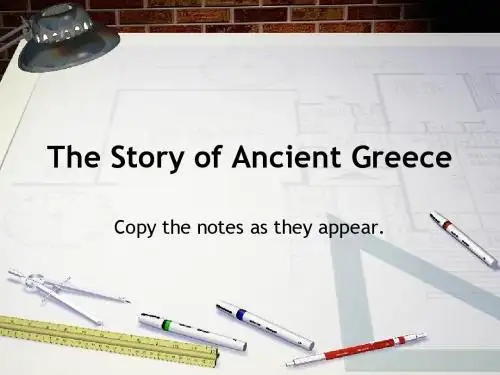
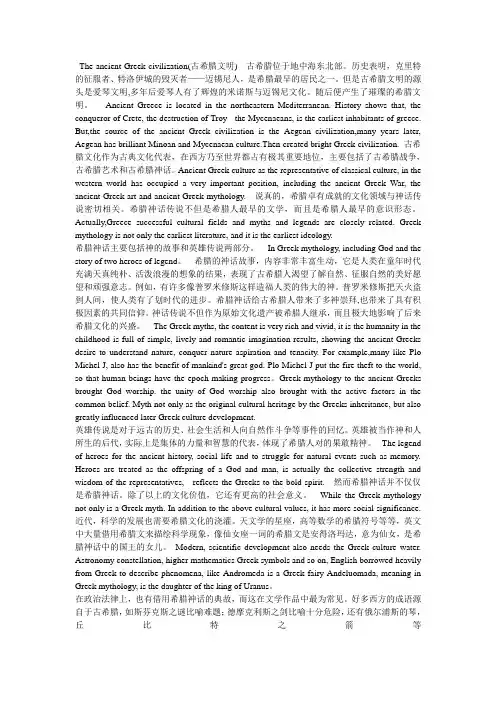
The ancient Greek civilization(古希腊文明) 古希腊位于地中海东北部。
历史表明,克里特的征服者、特洛伊城的毁灭者——迈锡尼人,是希腊最早的居民之一。
但是古希腊文明的源头是爱琴文明,多年后爱琴人有了辉煌的米诺斯与迈锡尼文化。
随后便产生了璀璨的希腊文明。
Ancient Greece is located in the northeastern Mediterranean. History shows that, the conqueror of Crete, the destruction of Troy - the Mycenaeans, is the earliest inhabitants of greece. But,the source of the ancient Greek civilization is the Aegean civilization,many years later, Aegean has brilliant Minoan and Mycenaean culture.Then created bright Greek civilization. 古希腊文化作为古典文化代表,在西方乃至世界都占有极其重要地位,主要包括了古希腊战争,古希腊艺术和古希腊神话。
Ancient Greek culture as the representative of classical culture, in the western world has occupied a very important position, including the ancient Greek War, the ancient Greek art and ancient Greek mythology. 说真的,希腊卓有成就的文化领域与神话传说密切相关。
希腊神话传说不但是希腊人最早的文学,而且是希腊人最早的意识形态。
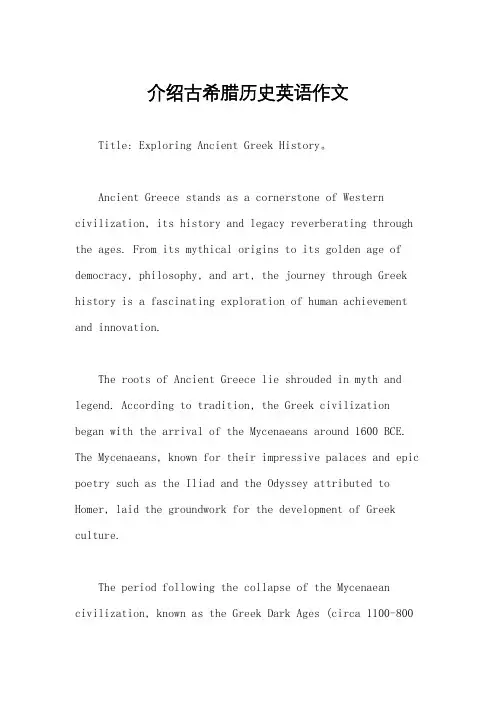
介绍古希腊历史英语作文Title: Exploring Ancient Greek History。
Ancient Greece stands as a cornerstone of Western civilization, its history and legacy reverberating through the ages. From its mythical origins to its golden age of democracy, philosophy, and art, the journey through Greek history is a fascinating exploration of human achievement and innovation.The roots of Ancient Greece lie shrouded in myth and legend. According to tradition, the Greek civilization began with the arrival of the Mycenaeans around 1600 BCE. The Mycenaeans, known for their impressive palaces and epic poetry such as the Iliad and the Odyssey attributed to Homer, laid the groundwork for the development of Greek culture.The period following the collapse of the Mycenaean civilization, known as the Greek Dark Ages (circa 1100-800BCE), was marked by a decline in population, literacy, and overall societal complexity. However, it also laid the foundation for the emergence of the Greek city-states, or polis, which would come to define the political landscape of ancient Greece.The Archaic Period (circa 800-500 BCE) witnessed the rise of city-states such as Athens and Sparta. Athens, with its democratic experiments under leaders like Solon and Cleisthenes, became a beacon of political innovation. Meanwhile, Sparta developed a militaristic society focused on discipline and prowess in battle.The pinnacle of Greek civilization is often associated with the Classical Period (circa 500-323 BCE). This era saw the flourishing of arts, philosophy, and literature. In Athens, the democratic system reached its zenith under the leadership of statesmen like Pericles, while intellectual giants like Socrates, Plato, and Aristotle laid the foundations of Western philosophy. The art of this period, epitomized by the sculptures of Phidias and the dramas of Aeschylus, Sophocles, and Euripides, still captivatesaudiences today.However, the glory of the Classical Period was not without its challenges. The Persian Wars (499-449 BCE) saw Greek city-states unite against the mighty Persian Empire, culminating in victories at Marathon, Thermopylae, and Salamis. These conflicts solidified Greek identity and inspired future generations with tales of valor and heroism.The aftermath of the Persian Wars ushered in a periodof conflict and upheaval known as the Peloponnesian War (431-404 BCE), pitting Athens and its allies against Sparta and its allies. The war, chronicled by Thucydides, highlighted the perils of unchecked ambition and thefragility of alliances. Despite its eventual defeat, Athens remained a cultural and intellectual powerhouse in the wake of the war.The Hellenistic Period (circa 323-31 BCE) witnessed the spread of Greek culture throughout the Mediterranean world following the conquests of Alexander the Great. Greek language, art, and philosophy became dominant across vastterritories, blending with local traditions to create arich tapestry of Hellenistic civilization.In conclusion, the history of Ancient Greece is a testament to the enduring legacy of human ingenuity and resilience. From its mythical beginnings to its lasting contributions to art, philosophy, and governance, the story of Ancient Greece continues to captivate and inspire generations across the globe.。
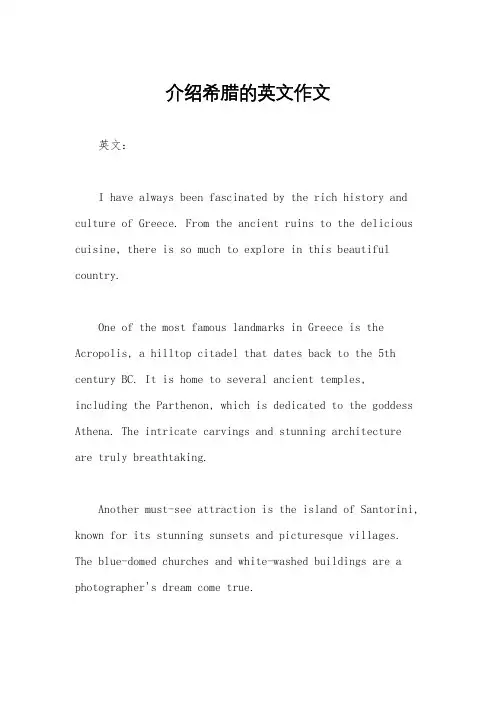
介绍希腊的英文作文英文:I have always been fascinated by the rich history and culture of Greece. From the ancient ruins to the delicious cuisine, there is so much to explore in this beautiful country.One of the most famous landmarks in Greece is the Acropolis, a hilltop citadel that dates back to the 5th century BC. It is home to several ancient temples,including the Parthenon, which is dedicated to the goddess Athena. The intricate carvings and stunning architecture are truly breathtaking.Another must-see attraction is the island of Santorini, known for its stunning sunsets and picturesque villages. The blue-domed churches and white-washed buildings are a photographer's dream come true.When it comes to food, Greece is famous for its Mediterranean cuisine. Some of my favorite dishes include moussaka, a layered dish of eggplant and ground beef, and spanakopita, a savory pie filled with spinach and feta cheese.Overall, Greece is a country that offers something for everyone, whether you are interested in history, culture,or just relaxing on a beautiful beach.中文:我一直对希腊的丰富历史和文化深感着迷。



the Ancient Greek Civilization ( I )古希腊(Greece)是西方文明的源头之一,古希腊文明持续了约650年(公元前800 年-公元前146年),是西方文明最重要和直接的渊源。
Ancient Greece is one of the sources of Western civilization. Ancient Greek civilization lasted about 650 years (800-146 BC), which is the most important and direct source of Western civilization.西方有记载的文学、科技、艺术都是从古代希腊开始的。
The recorded literature, technology and art in the West all started from ancient Greece.古希腊不是一个国家的概念,而是一个地区的称谓。
古希腊位于欧洲的东南部、地中海的东北部,包括希腊半岛、爱琴海和爱奥尼亚海上的群岛和岛屿、土耳其西南沿岸、意大利东部和西西里岛东部沿岸地区。
古希腊是指古代巴尔干半岛南部、爱琴海诸岛和小亚细亚沿岸的总称。
Ancient Greece does not only refer to the country, but the whole region,which was located in the southeast of Europe and the northeast of Mediterranean Sea, including Greek peninsula, archipelagos and islands in Aegean Sea and Ionian Sea, the southwest coast of Turkey, the east coast of Italy and the east coast of Sicily. Ancient Greece refers to the southern Balkans, Aegean islands and the coast of Asia Minor. The Aegean culture from 3000 BC to 2000 BC is the forerunner of its history.peninsula 英[p ninsj l ] 美[p nins l ]noun 半岛an area of land that is almost surrounded by water but is joined to a larger piece of landthe Iberian peninsula (= Spain and Portugal) 伊比利亚半岛archipelago [qki'pel g ] unoun【不规则形式】pl. -os or -oes群岛;列岛;群岛周围的海a group of islands and the sea surrounding themBalkans['bo:lk nz]noun [pl.]巴尔干(位于欧洲东南部,包括萨瓦河和多瑙河以南诸国)a region of SE Europe,including the countries to the south of the rivers Sava and Danube【派生词】Balkan adj. the Balkan Peninsula巴尔干半岛公元前5〜6世纪,特别是希波战争以后,古希腊地区的经济生活高度繁荣、科技高度发达,产生了光辉灿烂的希腊文化,对后世产生深远影响。

四大文明古国英语名称
四大文明古国的英文名是:
1、中国:
中国,英文名China。
以华夏文明为源泉、中华文化为基础,是世界上历史最悠久的国家之一。
中国各族人民共同创造了光辉灿烂的文化,具有光荣的革命传统。
中国是以汉族为主体民族的多民族国家,通用汉语、汉字,汉族与少数民族统称为“中华民族”,又自称“炎黄子孙”、“龙的传人”。
2、古希腊:
古希腊,英文名Ancient Greece。
是西方文明的源头之一,古希腊文明持续了约650年,是西方文明最重要和直接的渊源。
西方有记载的文学、科技、艺术都是从古代希腊开始的。
古希腊不是一个国家的概念,而是一个地区的称谓。
古希腊位于欧洲的东南部、地中海的东北部,包括希腊半岛、爱琴海和爱奥尼亚海上的群岛和岛屿、土耳其西南沿岸、意大利东部和西西里岛东部沿岸地区。
3、古印度:
古印度,英文名Ancient India。
地域范围包括今印度、巴基斯坦等国。
印度是一个文化的大熔炉,这个国家独特的历史背景使得它包含了从远古到现代、从西方到东方、从亚洲到欧洲等多种文化潮流。
再加上它是一个由五大民族构成的国家,本身就像一个大大的文化博物馆。
4、古埃及:
古埃及,英文名Ancient Egypt。
是四大文明古国之一。
位于非洲东北部尼罗河中下游,距今约740多年前,阿拉伯帝国将其伊斯兰化。
古埃及王国先后历经了:前王朝、早王朝、古王国、第一中间期、中王国、第二中间期、新王国、第三中间期、晚王国、托勒密王朝,共10个时期,33个王朝的统治。
Without the Greeks, who would have given us science, technology, democracy, politics, drama, and history? All of these words, as well as the ideas they represent, originated in ancient Greece.WHERE WAS ANCIENT GREECE?Greece is a mountainous peninsula that juts into the Mediterranean Sea. It includes hundreds of rocky islands off the coast. But the people of ancient Greece settled over a much wider area, from southern France to Asia Minor (now Turkey). Everywhere they went, they brought their language and traditions with them.WHEN DID GREEK CIVILIZATION BEGIN?The first Greek civilization developed on the Mediterranean island of Crete around 2200 BC. This civilization was called Minoan after a legendary ruler of Crete named Minos. The Minoans lived by farming, fishing, and seafaring. Their rulers built huge, brightly painted palaces. A magnificent palace at Knossos may have belonged to King Minos. The Minoans invented a way of writing, but no one today can read it.Soon after 1500 BC, Minoan civilization collapsed. Mycenae, a city on mainland Greece, rose to power. The Mycenaeans built palaces fortified with massive walls, and they rode in chariots. They must have been rich because beautiful objects of gold were found in their graves. The Mycenaeans were warriors. They fought each other, and they went to war in distant places, such as Troy in Asia Minor.These wars were disastrous for Greece. From 1000 to 750 BC, farming, craftwork, and trade suffered. People even forgot how to write!HOW DID GREECE REBUILD?Slowly, Greece recovered. The Greek people organized themselves into self-governing communities called city-states. Each city had homes, workshops, temples devoted to the Greek gods, markets, schools, sports arenas, and meeting places.A city-state also controlled the surrounding countryside. In villages and on farms, Greek families grew olives, grapes, and grain for food. They raised sheep and goats for hides and wool.Along the coast, people lived by fishing or by trading with other Mediterranean lands. They sold olive oil, wine, timber, and craft products.The Greeks were especially known for their excellent metalwork and painted pottery.The Greeks liked debating, questioning, and exploring new ideas. They admired logical arguments and scientific proof. They believed in justice and human dignity. But they were not all equal. Some Greeks were born free. Others were slaves with no rights. Greek men had freedom to work, study, and travel. Women spent their lives at home. They wove cloth, bore children, and cared for their families.The Greeks also believed in gods who controlled human lives. They honored the gods and made offerings to them. In return, they hoped for blessings. To please the gods, city-states held religious festivals, with competitions in music, dance, drama, poetry, and sports. The Olympic Games began as a religious festival of this kind, probably in 776 BC.WHICH WAS THE STRONGEST CITY-STATE?By around 500 BC, two city-states were supreme. Sparta was famous for its fearsome fighting men. It had a powerful ruling council, secret police, and spies. All its citizens—including women and children—were trained to be tough and brave. Slaves grew food.Athens was a democracy. All adult male citizens had the right to elect leaders, serve on juries, and debate government plans. Athenians prized learning and the arts. They asked the best artists, architects, philosophers, and writers to live and work in their city. From 480 to 359 BC, Athens collected tribute(payments) from smaller, weaker Greek cities. It used this money, and wealth from its silver mines, to buy warships. It also rebuilt the center of the city in magnificent style, with temples, statues, law courts, theaters, and strong walls.From 490 to 479 BC, Athens and Sparta fought together against invaders from Persia. But then they became rivals. From 431 to 404 BC, they fought each other in a bitter war. The war severely weakened both powers.HOW DID GREEK POWER END?In 338 BC, Greece was conquered by Macedonia, a kingdom to the north. City-states lost their political power, but Greek civilization continued and spread to many distant lands. Under Macedonian rule, Greek philosophers, mathematicians, and scientists made discoveries that are still useful today.In 146 BC, Roman armies invaded Greece. Roman leaders admired Greek achievements, and so Greek ideas and artistic styles spread still further, through the lands of the Roman Empire. In AD 395, Greece became part of the Byzantine Empire. It was ruled from the city of Constantinople (now Istanbul, Turkey). Greek language, knowledge, and technology remained important until the Byzantine Empire fell to Ottoman Turks in 1453.THE INFLUENCE OF ANCIENT GREECEToday, Greek civilization still shapes the way people think, speak, study, govern, design buildings, and spend their leisure time. Many words in the English language come from Greek roots. Questions raised by Greek philosophers are still debated. Greek plays are read and performed. The Olympic Games are held every four years, just as in ancient Greece. Many of our buildings—especially those with tall, round columns—are modeled after Greek buildings. The influence of ancient Greece is felt throughout Europe and in all the lands that European nations once ruled.。
Without the Greeks, who would have given us science, technology, democracy, politics, drama, and history? All of these words, as well as the ideas they represent, originated in ancient Greece.WHERE WAS ANCIENT GREECE?Greece is a mountainous peninsula that juts into the Mediterranean Sea. It includes hundreds of rocky islands off the coast. But the people of ancient Greece settled over a much wider area, from southern France to Asia Minor (now Turkey). Everywhere they went, they brought their language and traditions with them.WHEN DID GREEK CIVILIZATION BEGIN?The first Greek civilization developed on the Mediterranean island of Crete around 2200 BC. This civilization was called Minoan after a legendary ruler of Crete named Minos. The Minoans lived by farming, fishing, and seafaring. Their rulers built huge, brightly painted palaces. A magnificent palace at Knossos may have belonged to King Minos. The Minoans invented a way of writing, but no one today can read it.Soon after 1500 BC, Minoan civilization collapsed. Mycenae, a city on mainland Greece, rose to power. The Mycenaeans built palaces fortified with massive walls, and they rode in chariots. They must have been rich because beautiful objects of gold were found in their graves. The Mycenaeans were warriors. They fought each other, and they went to war in distant places, such as Troy in Asia Minor.These wars were disastrous for Greece. From 1000 to 750 BC, farming, craftwork, and trade suffered. People even forgot how to write!HOW DID GREECE REBUILD?Slowly, Greece recovered. The Greek people organized themselves into self-governing communities called city-states. Each city had homes, workshops, temples devoted to the Greek gods, markets, schools, sports arenas, and meeting places.A city-state also controlled the surrounding countryside. In villages and on farms, Greek families grew olives, grapes, and grain for food. They raised sheep and goats for hides and wool.Along the coast, people lived by fishing or by trading with other Mediterranean lands. They sold olive oil, wine, timber, and craft products.The Greeks were especially known for their excellent metalwork and painted pottery.The Greeks liked debating, questioning, and exploring new ideas. They admired logical arguments and scientific proof. They believed in justice and human dignity. But they were not all equal. Some Greeks were born free. Others were slaves with no rights. Greek men had freedom to work, study, and travel. Women spent their lives at home. They wove cloth, bore children, and cared for their families.The Greeks also believed in gods who controlled human lives. They honored the gods and made offerings to them. In return, they hoped for blessings. To please the gods, city-states held religious festivals, with competitions in music, dance, drama, poetry, and sports. The Olympic Games began as a religious festival of this kind, probably in 776 BC.WHICH WAS THE STRONGEST CITY-STATE?By around 500 BC, two city-states were supreme. Sparta was famous for its fearsome fighting men. It had a powerful ruling council, secret police, and spies. All its citizens—including women and children—were trained to be tough and brave. Slaves grew food.Athens was a democracy. All adult male citizens had the right to elect leaders, serve on juries, and debate government plans. Athenians prized learning and the arts. They asked the best artists, architects, philosophers, and writers to live and work in their city. From 480 to 359 BC, Athens collected tribute(payments) from smaller, weaker Greek cities. It used this money, and wealth from its silver mines, to buy warships. It also rebuilt the center of the city in magnificent style, with temples, statues, law courts, theaters, and strong walls.From 490 to 479 BC, Athens and Sparta fought together against invaders from Persia. But then they became rivals. From 431 to 404 BC, they fought each other in a bitter war. The war severely weakened both powers.HOW DID GREEK POWER END?In 338 BC, Greece was conquered by Macedonia, a kingdom to the north. City-states lost their political power, but Greek civilization continued and spread to many distant lands. Under Macedonian rule, Greek philosophers, mathematicians, and scientists made discoveries that are still useful today.In 146 BC, Roman armies invaded Greece. Roman leaders admired Greek achievements, and so Greek ideas and artistic styles spread still further, through the lands of the Roman Empire. In AD 395, Greece became part of the Byzantine Empire. It was ruled from the city of Constantinople (now Istanbul, Turkey). Greek language, knowledge, and technology remained important until the Byzantine Empire fell to Ottoman Turks in 1453.THE INFLUENCE OF ANCIENT GREECEToday, Greek civilization still shapes the way people think, speak, study, govern, design buildings, and spend their leisure time. Many words in the English language come from Greek roots. Questions raised by Greek philosophers are still debated. Greek plays are read and performed. The Olympic Games are held every four years, just as in ancient Greece. Many of our buildings—especially those with tall, round columns—are modeled after Greek buildings. The influence of ancient Greece is felt throughout Europe and in all the lands that European nations once ruled.。